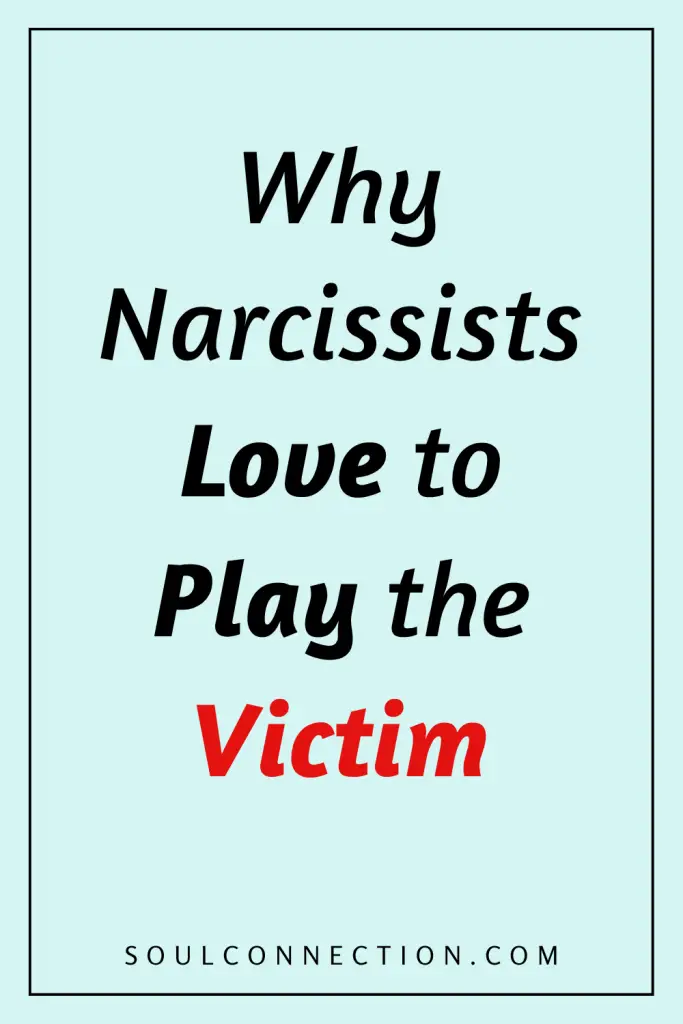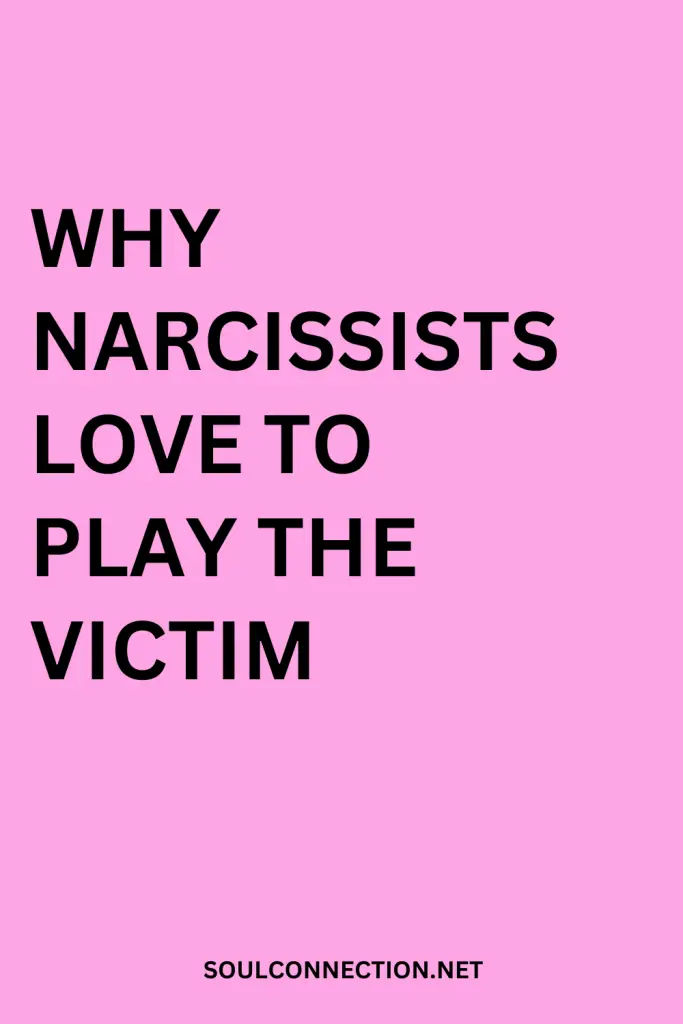Narcissists love a good plot twist. One minute, you’re gasping at the audacity of their latest demand. The next, they’re clutching their pearls, sighing about how misunderstood they are.
There’s a reason for this whiplash-inducing turn of events—and it’s not just for dramatic effect (though they do enjoy that). The victim card isn’t just in their deck; it’s practically glued to their hand.
Let’s get straight to the heart of why narcissists seem to revel in playing the victim, and how this trick keeps spinning the relationship merry-go-round.
Me? The Bad Guy? Never
A narcissist is like a cat that knocks a vase off the table and then looks at you as if you did it. Accepting blame is unthinkable.
If something goes wrong—someone’s upset, a boundary’s trampled, a friendship explodes—they instinctively position themselves as the afflicted one.
This is more than simple denial. For a narcissist, admitting fault is akin to a snake swallowing its own tail. Their self-image can’t withstand the idea of being at fault.
So, the story flips: suddenly, they’re the ones who’ve been wronged, overlooked, or attacked.
Cue the sighs. Cue the wounded looks. Cue everyone else scrambling to comfort them.
Attention Is Their Favorite Snack
Nothing tastes quite as sweet to a narcissist as a room full of concern focused on them. Sometimes, appearing powerful and in control scratches that itch. But “poor me” is a close runner-up.
Victimhood is a surefire way to get attention, especially from those with big, squishy hearts. Sympathy, support, even outrage on their behalf—it all feels like a warm bath of validation.
If you find yourself comforting someone who just destroyed your favorite mug (and is now crying about being misunderstood), you’ve stepped right into this dynamic.
It’s not always conscious manipulation. For many narcissists, it’s an automatic reflex. The moment their sense of self is threatened, they reach for the victim cloak and slip it on with Oscar-worthy conviction.
Control Wears Many Outfits
Every narcissist needs a little control to sleep at night. Some do it loudly, barking orders or making rules. Others manipulate more sneakily, often via victimhood.
Playing the victim flips the script: suddenly, you’re on the defensive, trying to prove you’re not the villain. Your energy goes into their feelings, their experience, their pain—and away from any questions about what they actually did.
It’s an old trick: if you’re too busy soothing them, you’re not holding them accountable.
Next thing you know, you’re apologizing for a crime you didn’t commit, just to keep the peace.
Accountability Is Kryptonite
Accountability is rarely on a narcissist’s vision board. Victimhood helps them dodge it with impressive agility.
Just when you’re about to have the “We need to talk about what happened” chat, they’re already halfway through a tearful monologue. “I can’t believe you think that of me!” “Everyone always blames me!”
Suddenly, your frustration feels mean. You’re the baddie, not them.
This isn’t childishness—it’s a deep-seated survival mechanism. By avoiding responsibility, they protect their fragile ego. Victimhood is their shield.
Sympathy Is a Powerful Currency
Ever notice how quickly people rally around someone in distress? Narcissists have. They understand that pain—real or exaggerated—brings out the best in others.
Sympathy can be leveraged for favors, forgiveness, or simply to keep someone wrapped around their finger.
The best part? If you’re the partner, you might feel especially responsible for their happiness. Cue the cycle: they play the victim, you comfort them, and their needs stay front and center.
It works like a charm—until you see the pattern.
They Rewrite History to Suit Their Needs
Conversations with a narcissist can feel like you’re discussing events on two different planets. Somehow, the time you calmly set a boundary becomes a story about how you “abandoned” or “attacked” them.
The thing you’re upset about? That’s not important. The real issue is how much you’ve hurt them.
Rewriting the script lets them slip into the victim role no matter what happened. Facts get fuzzy. Details get swapped. If you’re not careful, you’ll start doubting your own memory.
Gaslighting, anyone?
Guilt Trips Are Their Preferred Travel Method
Few things move people like guilt. Narcissists have a black belt in making others feel responsible for their pain. They’ll remind you of your “hurtful words” or how you “never understand them.”
Before you know it, you’re apologizing, baking apology brownies, or canceling your plans to prove your devotion.
Guilt shifts the focus from their actions to your supposed misdeeds. It’s sneaky, exhausting, and—unfortunately—highly effective with empathetic folks.
Their Self-Esteem Depends on Victimhood (Sometimes)
Narcissists may appear supremely confident, but their self-esteem is as flimsy as a house of cards in a breeze. When they feel criticized or exposed, victimhood offers an instant boost.
If they’re the one being attacked, they can’t possibly be the one at fault.
This coping mechanism lets them preserve their sense of superiority. It’s a strange loop: playing the victim helps them feel special, even when things don’t go their way.
Why Do People Fall for It?
If you’ve been ensnared by the “woe is me” routine, you’re not alone. Narcissists are skilled at making their pain believable—sometimes even to themselves.
Empathetic, caring people are especially vulnerable.
The urge to help, to soothe, to fix, can overpower the voice that says, “Wait, didn’t they just insult me ten minutes ago?” Factor in love, loyalty, or shared history, and it gets even trickier.
It’s not a sign of weakness to want to help. It’s proof you have a heart. But hearts need boundaries, too.
How to Stop Getting Sucked In
Now for the good stuff. If you’re tired of being cast as the villain in someone else’s soap opera, here are a few strategies to keep your sanity intact:
Set boundaries—clear, consistent, and not up for negotiation. When they launch into a pity party, try, “I’m happy to talk about this, but I won’t accept blame for things I haven’t done.”
Stick to the facts. If they start rewriting history, gently (but firmly) correct the record. “That’s not what happened. Here’s my memory of it.”
Limit your emotional investment.
Their pain can feel urgent, but remember: not every emergency they declare is actually your responsibility. Sometimes, silence is your friend.
If you feel yourself spiraling into guilt, pause. Ask yourself, “Is this about me, or is this about their discomfort with the truth?”
Support is lovely, but self-sacrifice isn’t required. Give yourself permission to step away, regroup, and protect your peace.
Therapists aren’t just for “broken” people—they’re for anyone who needs support, reality checks, or a fresh perspective. If you’re feeling worn out, reaching out to a professional is a power move, not a sign of failure.
When Victimhood Turns Toxic
A little self-pity is human. But when someone weaponizes victimhood to control, guilt-trip, or avoid consequences, the relationship gets lopsided fast.
One minute, you’re trying to solve a problem together; the next, every conversation becomes about their suffering. Your needs vanish, your opinions shrink, and resentment festers.
That’s not a partnership—it’s emotional labor, unpaid and unending.
Healthy relationships thrive on accountability, honesty, and mutual support. If you’re always cast as the villain, it might be time to audition for a new show.
Should You Confront the Behavior?
Sometimes, you can gently point out the pattern. “I notice that when we disagree, you often end up feeling hurt or attacked. Can we talk about that?”
Don’t expect instant change. Narcissists tend to double down when confronted, and self-reflection isn’t their strong suit. But naming the pattern can shift the dynamic, even if just a smidge.
If you’re in a relationship where victimhood becomes abuse—threats, manipulation, or emotional blackmail—it’s crucial to prioritize your safety and well-being.
That may mean setting firmer boundaries, seeking outside help, or, in some cases, planning your exit.
Self-Compassion for Survivors
Getting caught in a narcissist’s victim act can leave you feeling wrung out, confused, and even ashamed. After all, you just wanted to help.
Maybe you still love them. Maybe you’re furious with yourself for falling for the same trick—again.
Here’s the truth: It’s not about your intelligence, strength, or worth. Narcissists are masterful at twisting stories and emotions. If you’ve been drawn in, it’s proof you’re empathetic—not gullible.
Self-compassion is your get-out-of-jail-free card. Forgive yourself for the times you bent over backward. Take pride in every step you take toward clarity, boundary-setting, and self-advocacy.
Your story isn’t over. You’re just learning new roles.
Reclaiming Your Role in the Story
Narcissists may always reach for the victim costume—old habits die hard, especially when they’re so effective. But you get to choose whether you play along.
With boundaries, awareness, and a little humor (never hurts), you can step out of their script and write your own story. Victimhood may be their favorite part to play, but you’re not obligated to be their audience—or their scapegoat.
No standing ovation required. Just your own peace of mind.


